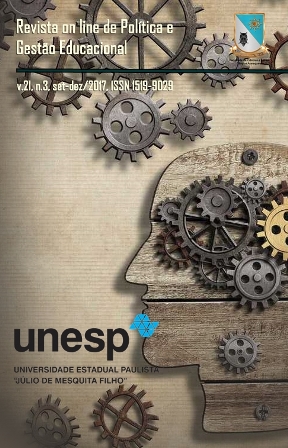Inclusion in child education: challenges and possibilities through pedagogical practices
DOI:
https://doi.org/10.22633/rpge.v21.n3.2017.10170Keywords:
Inclusion. Child education. Special education. Teacher training.Abstract
This article aims to raise a discourse about the process of inclusion in early childhood education through pedagogical practices. Due to the increasing number of children with special needs entering regular classes in early childhood education, the school needs to be prepared not only in the accessibility part but also in the training of education professionals. And from this perspective, the classroom becomes the place in which the practice constructed in everyday life can promote inclusion. We know of the difficulties encountered in schools for this inclusion to happen, the lack of specialized material, the gaps in training, the lack of teachers, are some of these challenges. Therefore, in this article, based on theorists of the field, we analyze not only the challenges but also the possibilities that we can find through practice, seeking to reflect, and perhaps, finding ways to promote inclusion, that is, to guarantee an education Of quality and respecting the uniqueness of each one.
Downloads
References
BRASIL. MEC. Declaração de Salamanca. Brasília, 1994.
BRASIL. Lei de Diretrizes e Bases da Educação Nacional, Lei nº 4.024, de 20 de dezembro de 1961.
BRASIL. Lei de Diretrizes e Bases da Educação Nacional, Lei n° 9.394, de 20 de dezembro de 1996.
BRASIL. Lei nº 12.796, de 4 de abril de 2013.
DRAGO, R. Uma fresta na janela: A educação inclusiva. In: Inclusão na educação infantil. Rio de Janeiro, Wak Editora, 2011.
FREIRE, M. et al. Grupo, indivíduo, saber e parceria: malhas do conhecimento. São Paulo: Espaço pedagógico, 1997.
HINE, J. T. Making collaboration work in inclusive. hing school clasrooms: recommendations for principals. Intervention in scholl and clinic, v. 43, n. 5, p. 277-282, 2008.
KASSAR, M. de C. M. Educação especial no Brasil: desigualdades e desafios no reconhecimento da diversidade. Educ. Soc., Campinas, v. 33, n. 120, p. 833-849, jul.-set. 2012.
MINISTÉRIO DA EDUCAÇÃO. A inclusão de crianças com deficiência na educação infantil. Ministério da Educação, novembro de 2007. Disponível em: http://portal.mec.gov.br/seb/arquivos/pdf/Educinf/revista44.pdf. Acesso em: 19 jan. 2017.
MANTOAN, M. T. E. A Educação especial no Brasil: da exclusão à inclusão escolar. Disponível em: http://www.lerparaver/bancodeescola. Acesso em: 23 jan. 2017.
NÓVOA, A. Formação de professores e profissão docente. In: NÓVOA, A. (coord.). Os professores e a sua formação. Lisboa: Dom Quixote, 1995.
NECESSIDADES EDUCATIVAS ESPECIAIS. O diagnóstico de Necessidades Educativas Especiais (NEE). Disponível em: http://neeiscia.blogspot.com.br/2007/08/o-diagnstico-de-necessidades-educativas.html. Acesso em: 20 jan. 2017.
PESSOA. F. “O Guardador de Rebanhos”. In: Poemas de Alberto Caeiro. (Nota explicativa e notas de João Gaspar Simões e Luiz de Montalvor). Lisboa: Ática, 1946 (10ª ed. 1993).
VIANA, J. M. Educação e cidadania começam na infância. IN: SOUSA, R. C. de.; BORGES, M. F. S. T. (orgs.). A práxis na formação de educadores infantis. Rio de Janeiro: DP&A, 2002, p. 56.
VYGOTSKY, L. S. Aprendizagem e desenvolvimento intelectual na idade escolar. In: Vygotsky, L. S.; LURIA, A. R.; LEONTIEF, A. N. Linguagem, desenvolvimento e aprendizagem. Trad.: Maria da Penha Villa lobos. 6ª ed. São Paulo: Ícone, 1998. (Trabalho originalmente publicado em 1933).












